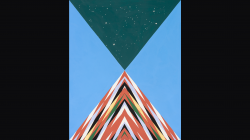With the appointments of Laura De Becker, the inaugural Helmut and Candis Stern Associate Curator of African Art, and Jennifer M. Friess, the inaugural Assistant Curator of Photography, this is the third curatorial posting at UMMA in a year.
“We are delighted to welcome these three outstanding curatorial voices to the Museum, joining Natsu Oyobe, who was promoted to full Curator of Asian Art last May," UMMA Interim Director Kathryn Huss says. "Each is involved in organizing captivating exhibitions—two opening in this month and one in March 2017—and developing innovative programming for the future. This is an auspicious time for UMMA as the multi-faceted collection continues to grow, we have our first endowed curatorial position thanks to the generosity of Helmut and Candis Stern, and an array of exhibitions, public programs, and initiatives is developed and launched.”
Keelmann (right), who earned her Ph.D. in the History of Art at the University of Michigan (the degree will be officially conferred in December), served as the Andrew W. Mellon Curatorial Fellow in the History of Art at UMMA during the 2014‒15 academic year. In partnership with Senior Curator Carole McNamara (now Emerita), Oyobe, and Deputy Director for Education Ruth Slavin, Keelmann researched and co-curated, Soviet Constructivist Posters: Branding the New Order (2015). Additionally, she has worked on projects in collaboration with the Art Museum of Estonia. Keelmann is curating the upcoming exhibition Europe on Paper: The Ernst Pulgram and Frances McSparran Collection, part of UMMA’s permanent collection. The exhibition opens October 15, and remains on view through January, 29, 2017.
Joining UMMA in September 2015, De Becker earned her Ph.D. from the Sainsbury Research Unit, University of East Anglia (UK). She was an Andrew Mellon Postdoctoral Fellow at the Wits Art Museum, University of the Witwatersrand, Johannesburg, where she researched and curated a number of exhibitions including Mapping/Making (2014) showcasing different genres in African art, and Lifelines (2014) for the Standard Bank Gallery exploring the concept of object biographies. De Becker, who plans to expand the collection with contemporary work from East and South Africa, is curating Traces: Reconstructing the History of a Chokwe Mask, from UMMA’s African Art collection, tracing the object’s history from its origins in Angola to its arrival in UMMA’s permanent collection in 2005.The exhibition opens October 22, and remains on view through January 22, 2017.
Friess, appointed to her post in January 2016, is currently a Ph.D. candidate in History of Art at the University of Kansas, Lawrence. She began her doctoral studies in 2010, after receiving a Master of Arts degree from Case Western Reserve University and a Bachelor of Fine Arts degree from the Rochester Institute of Technology. She worked at the George Eastman House, International Museum of Photography and Film; the Cleveland Clinic Foundation Art Program; and, most recently, at the Spencer Museum of Art at the University of Kansas. Friess is curating the upcoming exhibition Willow Run opening in March 2017.
Oyobe earned her Ph.D. in the History of Art from the University of Michigan. Specializing in modern and contemporary Japanese art, Oyobe has curated numerous Japanese art exhibitions at UMMA, including Wrapped in Silk and Gold: A Family Legacy of Japanese Kimono of the 20th Century (2010) and Paramodel (2014), the first American exhibition of the Kansai-based artist collaborative. Oyobe is also involved in projects of various cultures and time spans, that included the solo exhibition of Korean and American artist duo Young-hae Chang Heavy Industries (2012), Isamu Noguchi and Qi Baishi: Beijing 1930 (2013), and Xu Weixin: Monumental Portraits (2016). Oyobe is curating the upcoming exhibition Japanese Prints of Kabuki Theater from the Collection of the University of Michigan Museum of Art. The exhibition opens October 15, and remains on view through January 29, 2017.
“The University, celebrating its bicentennial in 2017, placed art as one of the founding pillars of a University of Michigan education—developing global, well-rounded citizens,” Interim Director Huss added. “The curatorial team looks forward to building on that legacy with rigorous and thought-provoking programming.”

